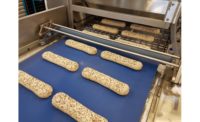 Imagine having to produce a multitude of high-quality snacks on minimum production space. Furthermore, you require very fast changeover times, small-batch manufacturing—and a way to quickly deliver your product to new customers. Naturally, this calls for equipment that is highly flexible and neither compromises on quality nor safety. This is the path a Japanese biscuit company chose to walk with a knowledgeable companion. Syntegon Technology, formerly Bosch Packaging Technology, helped the cracker experts to boost production flexibility with the latest generation of its compact two-in-one system solution.
Imagine having to produce a multitude of high-quality snacks on minimum production space. Furthermore, you require very fast changeover times, small-batch manufacturing—and a way to quickly deliver your product to new customers. Naturally, this calls for equipment that is highly flexible and neither compromises on quality nor safety. This is the path a Japanese biscuit company chose to walk with a knowledgeable companion. Syntegon Technology, formerly Bosch Packaging Technology, helped the cracker experts to boost production flexibility with the latest generation of its compact two-in-one system solution.
In today’s highly dynamic snack markets, with customers constantly on the lookout for new experiences, flexibility is vital for any company’s economic survival. The more flexible the equipment is, the quicker companies can address market demands, which helps them to secure new business. Those who add versatility to their production processes not only produce a bigger variety of pack sizes able to attract more customers. They also keep their overall product stocks low, thus reducing interests on bound capital.
Small footprints matter
Given its confined production space, a Japanese biscuit and cracker company was looking to boost its manufacturing flexibility. Reaching this goal, however, is not about simply adding a new production hall. It is about making the most out of existing space, by using the actual oven with vibratory channel handling equipment and increasing the production that is being realized with it. Moreover, the producer decided to replace its machinery with more compact flexible packaging equipment, without compromising on the high quality it is known for. The company wanted to run state-of-the-art flow wrapping and cartoning machinery to efficiently pack its wide variety of snacks, from sweet biscuits to hearty crackers—while still fitting into its facility. This is where Syntegon Technology, formerly Bosch Packaging Technology, came into play. The company was considered a quality-conscious partner offering precision technology that ensures the products’ value.
Following a meticulous analysis of the company’s production conditions, Syntegon Technology presented a versatile solution that would meet the manufacturers needs in full. Syntegon’s approach combines existing handling equipment like vibratory channels with new equipment for increased flexibility, small footprint, gentle and high-quality production of delicate snacks. The company recommended a compact cracker packaging line consisting of a patented feeding system with a Sigpack ZZKT turbo magazine, a flexible dual infeed system with smart slug/pile grouping capabilities, a Sigpack Two-in-One horizontal slug and pile machine and a TTM 100 integrated topload cartoner.
Together, the components form an efficient and highly flexible packaging line for different-sized crackers, from rectangular to circular products. For the first time Syntegon coupled on-edge handling equipment for biscuits with a Sigpack two-in-one packaging system featuring magazines with linear motors. The combination enables a quick switch between pack styles from slug to pile and handles product volumes of one to five items. Compared to traditional lines in the industry, the Syntegon design allows for fast changeovers that don’t affect the machine’s overall equipment effectiveness (OEE). What’s more, the fast format changes help the cracker business to meet customer demands quickly, so that product stocks remain low. This enables the cracker company to reduce storage costs and stock-related interests on bound capital. Product quality is secured at any time.
More than a magazine
The patented Sigpack ZZKT turbo magazine with the dual line linear motor infeed system is the heart of the versatile packaging line. Crackers are brittle and shock-sensitive, so they require gentle handling at every process stage. The freshly baked goods enter the magazine’s four fully motorized lanes on edge from the vibratory channels. Each lane dispatches up to 1,500 products per minute on the dual lane belt feeder below. Thanks to a patented rotary star mechanism, each magazine counts and places the crackers in shingled rather than straight lines to save precious space on the lanes. Unlike other industry solutions, the patented system ensures a much slower and therefore gentler placement of the baked goods. This results in higher product quality to satisfy a demanding clientele.
Slug or pile at the push of a button—the Two-in-One principle
Once counted and placed, the cracker’s journey has only just begun. On their rapid way to the Two-in-One flow wrapper, they pass the Sigpack FIFD. The special product infeed groups two product lanes for either slug or pile packs into one lane. Flexibility is a major asset of the two-in-one FIFD: Depending on the product, operators can change between pile or slug at the push of a button. If, for example, a slug of nine crackers is needed, the ZZKT magazine places nine crackers in a shingled manner and then the FIFD module group a slug by pushing the crackers to stand on edge to form a slug of nine. For a pile pack, the ZZKT places four crackers in the same manner, but this time the FIFD module pushes the crackers to form a pile of four. Thanks to its small footprint, the FIFD mirrors the space-saving design of the ZZKT magazine while surpassing the latter’s output: the FIFD can process up to 2,400 products per minute.
Tightly wrapped
Regardless of count or piling type, the reliable Two-in-One horizontal flow wrapper packs each product in an air-tight protective wrap. The compact machine offers heat-sealing at maximum speed: it processes up to 90 meters of film per minute to ensure each snack stays oven-fresh. The flow wrapper’s modular and hygienic design boosts product quality even further since the machine components are easily accessible for maintenance and cleaning. Product debris can easily be wiped of the machine’s surface or falls into dedicated crumb trays.
Product presentation on shelve—thanks to flexible toploading
In a final step, the flow wraps move on to the highly flexible TTM 100 topload cartoner, which gently loads between 30 and 150 packs into a carton per minute. A broad variety of carton styles, including tri-seal closure, open tray, tray and hood or tuck-in lid is possible, granting the biscuit company extra flexibility regarding the final product presentation on-shelf. The changeover times between the various secondary pack styles are fast, adding to the overall flexibility of the Syntegon packaging line from start to finish. Since service and modernisation are key for any biscuit producer, the Japanese company can turn to Syntegon for help. The company’s service experts are based in the country to guarantee support during the full life cycle of the system. With this kind of partnership, the prospects for cracker production look promising—which is great news for those ever-curious customers looking for their next snack.
About Syntegon Technology
Syntegon Technology is a leading global process and packaging technology provider. Formerly the packaging division of the Bosch Group, the company, headquartered in Waiblingen (Germany), has been offering complete solutions for the pharmaceutical and food industries for over 50 years. More than 6,100 employees at 30 locations in more than 15 countries generated a total revenue of 1.3 billion euros in 2019. The portfolio of intelligent and sustainable technologies includes stand-alone machines, as well as complete systems and services. Fields of application in the pharmaceutical industry are the production, processing, filling, inspection and packaging of liquid and solid pharmaceuticals (e.g. syringes and capsules). In the food industry, the portfolio includes process technology for confectionery as well as packaging solutions for dry foods (e.g. bars, bakery products and coffee), frozen foods and dairy products.






